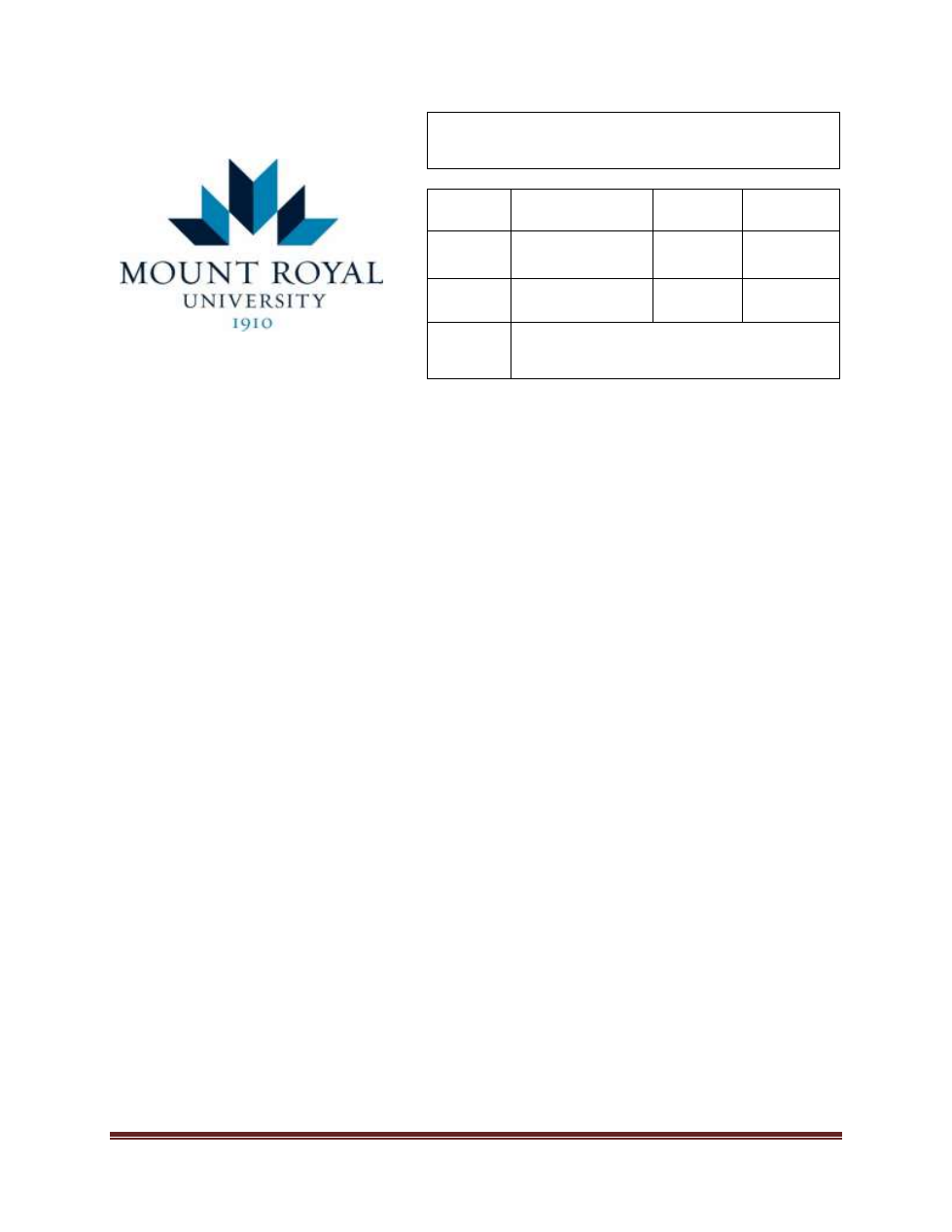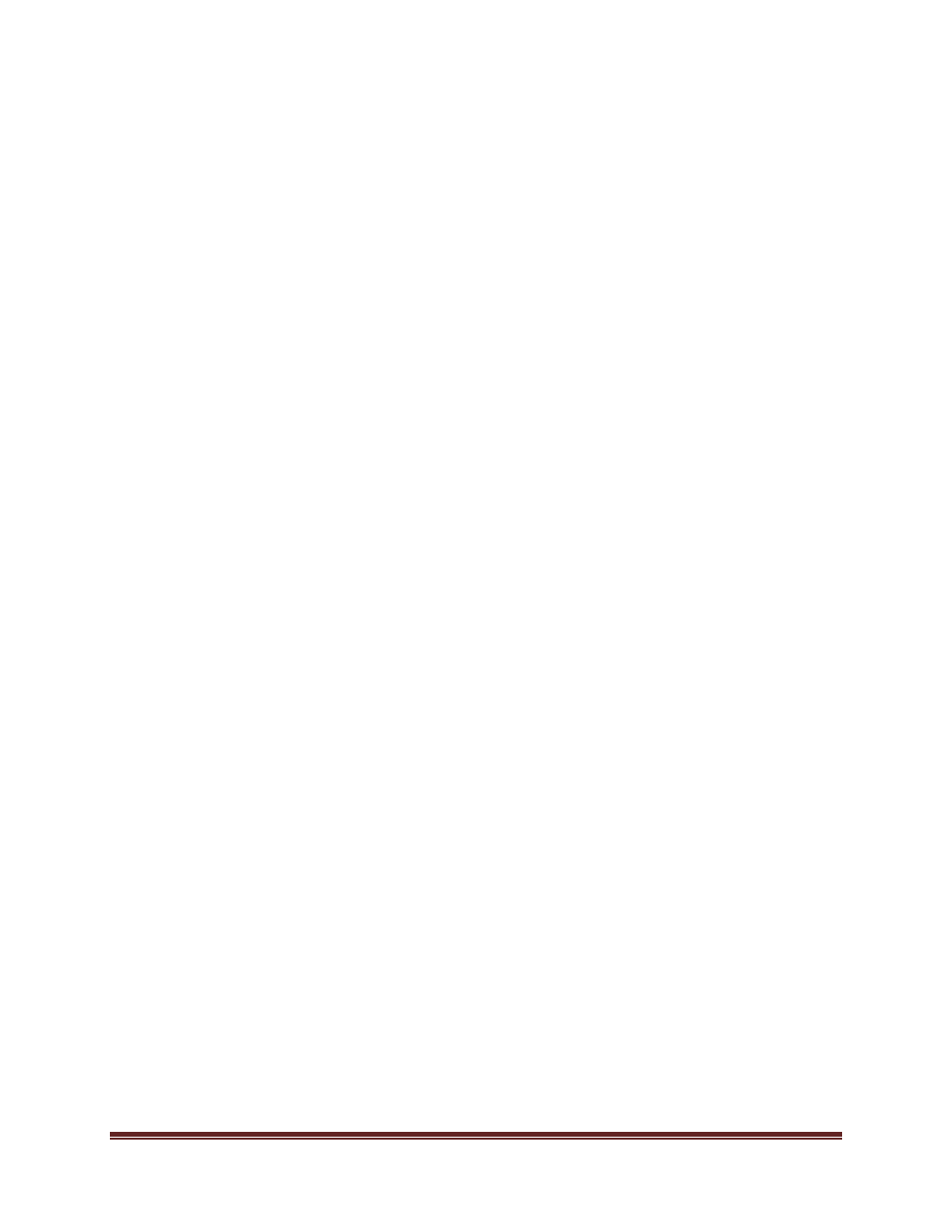
Academic Timetabling Policy – October 20, 2016
Page 1 of 8
ACADEMIC TIMETABLING POLICY
Policy
Type:
Academic
Initially
Approved:
January 2,
2008
Policy
Sponsor:
Provost & Vice-
President, Academic
Last
Revised:
October 20,
2016
Primary
Contact:
Registrar AVP
Enrollment
Management
Review
Scheduled:
April 1, 2027
Approver:
General Faculties Council
A.
OVERVIEW
This Policy is intended establish a transparent and effective timetabling process in order to facilitate
the widest range of course selection for both students and faculty. It will ensure that all teaching
and learning activities are supported, while optimizing the access and use of academic space and
supporting revenue generating activities.
B.
PURPOSE
The purpose of this Policy is to ensure that instructors' pedagogical requirements, students' access
to desired courses, and program needs are balanced through effective facility management. The
underlying assumptions for the intent and purpose of this Policy are that:
1.
All space is owned and allocated by the University.
2.
All space is incorporated into the room inventory and assigned in an effective and equitable
manner.
C.
SCOPE
This Policy applies to the scheduling of all classrooms and labs used for University-related
instructional purposes including final examinations and research. Use of classrooms and labs for
non-instructional and/or non-University activities falls within the scope of the related policy for
events.
D.
POLICY STATEMENT
1.
ASSIGNMENT OF ACADEMIC SPACE
The following academic room access classification applies only to bookable teaching space
and is applicable to all teaching activities.
1.1
Academic Room Access Classification
a. Open
i.
Space is open to all departments without scheduling restriction
ii.
Scheduling Services schedules rooms in this category.

Academic Timetabling Policy – October 20, 2016
Page 2 of 8
b. Open - Priority
i.
Scheduling of a room can be designated to one or more approved
faculties/departments and will be scheduled accordingly.
ii.
Space in this category is available for general use after courses or
activities from approved priority faculties/departments have been
scheduled.
iii.
In the event that the approved faculties/departments do not require the
classroom/lab, the space will be scheduled as open access.
iv.
Scheduling Services schedules rooms in this category.
c. Open - Dedicated
i.
Access to space is restricted to a department but is bookable for
academic purposes, ad hoc and/or event bookings.
ii.
The department with booking authority may work with Scheduling
Services to timetable space in this category.
d. Dedicated
i.
Access to space is restricted to approved faculties/departments.
ii.
A room can be dedicated space for one or more faculties/departments
as approved by the Expansion Committee.
iii.
In the event that the approved faculties/departments do not request the
classroom/lab, the space remains unscheduled.
iv.
Scheduling Services does not schedule space in this category.
1.2
Scheduling Priorities for Open Access Academic Space
a. Credit Instruction
b. Credit-free Instruction
c. Student Learning Support
d. Other Mount Royal Education Activities
e. Other Activities
1.3
Timetabling Principles
a. The establishment of timetable patters is intended to create a balance between
the need for flexibility at the department level and optimization of space for the
institution.
b. Exceptions to the regular timetabling patters will be considered at the request of
the Chair and with the approval of the Registrar.
c. The institutional expectation is that faculty members will release the use of a
classroom when it is not required.
1.4
Timetabling Patterns
a. All daytime courses are scheduled Monday to Friday, 0830 to 1730 hours,
according to the following standard timetable patterns.
b. One (1) hour classes (one-hour blocks)
i.
Monday
ii.
Tuesday
iii.
Wednesday
iv.
Thursday
v.
Friday

Academic Timetabling Policy – October 20, 2016
Page 3 of 8
c. One-and-a-half (1.5) hour classes (one-and-a-half-hour blocks)
i.
Monday
ii.
Tuesday
iii.
Wednesday
iv.
Thursday
v.
Friday
d. Two (2) hour classes (one-hour blocks)
i.
Monday / Wednesday
ii.
Tuesday / Thursday
iii.
Wednesday / Friday
e. Two (2) hour classes (two-hour blocks)
i.
Monday
ii.
Tuesday
iii.
Wednesday
iv.
Thursday
v.
Friday
f. Three (3) hour classes (one-hour blocks)
i.
Monday / Tuesday / Thursday
ii.
Monday / Wednesday / Friday
iii.
Tuesday / Thursday / Friday
g. Three (3) hour classes (one-and-a-half-hour blocks)
i.
Monday / Wednesday
ii.
Tuesday / Thursday
iii.
Wednesday / Friday
h. Three (3) hour classes (three-hour blocks)
i.
Monday
ii.
Tuesday
iii.
Wednesday
iv.
Thursday
v.
Friday
i. Four (4) hour classes (one-hour blocks)
i.
Monday / Tuesday / Thursday / Friday
j. Four (4) hour classes (Two-hour blocks)
i.
Monday / Wednesday
ii.
Tuesday / Thursday
iii.
Wednesday / Friday
k. Five (5) hour classes (one-hour blocks)
i.
Monday / Tuesday / Wednesday / Thursday / Friday
l. Evening classes may take the form of any of the daytime patterns, starting at
1800 hours or later, but ending no later than 2200 hours.
m. Classes that are not one, one-and-a-half, two or three hours long will be
scheduled using a combination of the standard patterns.

Academic Timetabling Policy – October 20, 2016
Page 4 of 8
2.
SCHEDULING RESTRICTIONS
Scheduling restrictions are necessary to implement the scheduling principles and facilitate
the effectiveness of the scheduling process.
2.1
Institutional Limitations
a. The teaching day shall not exceed eight (8) hours from the beginning of the first
teaching hour to the end of the last teaching hour. Exceptions are experiential
learning courses (e.g., clinical or practicum placements, directed field studies).
b. Teaching shall not exceed six (6) hours in any day.
c. The maximum number of consecutive teaching hours shall not exceed four (4).
d. The maximum number of 0830 classes is three (3) per week, per semester, per
instructor.
e. The maximum number of classes ending at 1730 is three (3) per week, per
semester, per instructor.
f. The minimum break between courses after the maximum number of consecutive
hours taught shall be one (1) hour.
g. A minimum of fourteen (14) hours shall elapse between the completion of
teaching one day and the commencement of teaching the next day.
h. Weekly lecture classes will be scheduled with at least one day between lectures
to the extent a room is available. The weekend will be considered as providing
for one day between lectures.
2.2
Individual Exceptions
An instructor may be scheduled to teach in any daytime time pattern unless they
request an individual exception to availability. Exceptions of different types fall under
the three categories outlined below. Individual exceptions are not provided in
perpetuity and must be requested each semester unless otherwise specified by
Human Resources. Chairs are responsible for ensuring that the appropriate
procedures are followed to request the exception as outlined below:
a. Category 1 (legally obligated to accommodate)
i.
Category 1 requests may be made related to one or more protected
grounds under the Alberta Human Rights Act. The University is
responsible for taking steps to accommodate instructor’s needs based
on protected grounds to the point of undue hardship for the University.
ii.
Formal supporting documentation must accompany a Category 1
request; Human Resources will engage in the procedure that they have
developed and will advise Scheduling Services of the accommodation
or change in accommodation, if any, that results from the
implementation of the procedure.

Academic Timetabling Policy – October 20, 2016
Page 5 of 8
b. Category 2
i.
Category 2 requests may be made related to an instructor’s work-related
responsibilities or professional commitments: These include
participation in General Faculties Council and/or any of its standing
committees, the Human Research Ethics Board, Chairs’ Assembly, or
other university committees approved by the Provost; community and
professional commitments directly related to an instructor’s academic
expertise; and research days.
ii.
Chairs will recommend and Dean’s Advisory Groups (DAGs) will
approve Category 2 requests. Approved requests will be entered in the
scheduling software, but an exception is not guaranteed.
c. Category 3
i.
Category 3 requests may be made related to personal circumstances or
preferences that do not fall under the first two categories. Category 3
requests involve declaring a preference to teaching during one or two
time blocks:
•
Morning preference: instructor can be scheduled between 0830
and 1500, Monday to Friday.
•
Afternoon preference: instructor can be scheduled between 1100
and 1730, Monday to Friday.
ii.
Chairs will recommend and Dean’s Advisory Groups (DAGs) will
approve Category 3 requests. Approved requests will be entered into
the scheduling software, but an exception is not guaranteed.
2.3
Rolled Classes with Department Assigned Times
a. Departments are permitted to assign times to classes that will roll (i.e., be
scheduled in the same time slot) from semester to semester for a period of three
years.
b. 35% of each department’s classes will be rolled forward to the next like term as
follows:
i.
A maximum of 25% of each department’s classes can occur between
1000 and 1600 hours, and the courses must be distributed equally
across the time patterns in this range.
ii.
5% of each department’s classes must occur at each of the 0830 and
1600 time patterns.
iii.
Classes scheduled in Open – Dedicated and Dedicated spaces will not
be included in the 35%. These spaces will continue to be managed at
the department level.
c. Scheduling Services will review the rolled portion of the timetable with each
department at the conclusion of the third year.
2.4
Faculty
a. A Faculty can request a common meeting time, maximum 2 hours per week, per
semester, to accommodate all faculty, departmental and discipline meetings.

Academic Timetabling Policy – October 20, 2016
Page 6 of 8
b. Once classes have begun, requests for ad hoc room bookings will be processed
on a first come, first served basis.
2.5
Program
When possible, academic departments should consider the following program
constraints when scheduling courses. Exceptions will be music and studio classes,
theatre productions, clinical, field placements and credit-free courses.
It is understood that students may select options and elective courses according to
their preference and convenience.
a. Students’ day in scheduled classes should not exceed eight (8) hours.
b. The maximum number of scheduled hours for students per day is six (6).
c. The maximum number of consecutive scheduled hours per day is four (4).
d. Students finishing classes at 2200 will not be scheduled at or before 0830 the
following day.
e. The maximum amount of non-scheduled time between classes should be no
more than three (3) hours.
f. All students must have a minimum of ten (10) minutes between classes.
2.6
Room
a. All final examinations will be scheduled Monday to Saturday.
b. No examination will start before 0800 hours.
c. No examination will be scheduled to finish later than 2200 hours.
d. The maximum number of examinations in a calendar day for an individual
student will be two (2).
e. There will be a minimum of thirty (30) minutes between daytime examinations.
f. There will be a minimum of sixty (60) minutes between a daytime examination
and an evening examination.
2.7
Final Examinations
a. All final examinations will be scheduled Monday to Saturday.
b. No examination will start before 0800 hours.
c. No examination will be scheduled to finish later than 2200 hours.
d. The maximum number of examinations in a calendar day for an individual
student will be two (2).
e. There will be a minimum of thirty (30) minutes between daytime examinations.

Academic Timetabling Policy – October 20, 2016
Page 7 of 8
f. There will be a minimum of sixty (60) minutes between a daytime examination
and an evening examination.
3.
FINALIZING THE TIMETABLE
3.1
The Registrar has the authority to finalize and approve the timetable for each
semester; this will occur prior to the opening of registration for that semester.
3.2
Once the timetable for any semester has been approved, further requests for
changes to day and time will only be considered in extraordinary circumstances or if
a Category 1 exception is required. Changes to day and time of a course section
after finalization of the timetable must be approved by the Chair and the Registrar.
3.3
When day and time changes for a course section occur, academic departments are
responsible for advising all students in the affected class and associated faculty
members.
3.4
Concerns about the physical condition of space are to be brought directly to the
attention of the Physical Resources department by the faculty member or the Chair.
E.
DEFINITIONS
(1)
Bookable Space:
any space used for a course, event and/or ad hoc booking.
The availability of any space is dependent on its access
classification
(2)
Daytime Classes:
classes held Monday to Friday between 0830 and 1730. Labs
can start at 8am at the request of the department chairperson
(3)
Evening Classes:
classes held Monday to Thursday between 1800 and 2200
(4)
Exception:
a limitation built into the scheduling system
(5)
Instructional Hour:
calculated to allow for sufficient travel time between classes
(6)
Policy:
means the Academic Timetabling Policy
(7)
Prime Time:
refers to the hours between 0900 and 1600, Monday to Friday,
when the majority of classes are scheduled
(8)
Scheduling:
an administrative process that incorporates the elements of the
timetable
(9)
Timetable:
includes all details associated with the academic space, the
time (i.e., day of the week and time of day), the faculty member
associated with the space and time, student access (i.e.,
restricted or non-restricted course) and any instructional
equipment associated with the space
(10)
University
means Mount Royal University
(11)
Weekend Classes:
classes held Saturday and/or Sunday between 0830 and 1600

Academic Timetabling Policy – October 20, 2016
Page 8 of 8
F.
RELATED POLICIES
•
Academic Schedule Policy
G.
RELATED LEGISLATION
•
Alberta Human Rights Act
•
Post-secondary Learning Act, SA 2003, c P-19.5
•
Alternative Academic Council Regulation, Alta Reg 219/2006
H.
RELATED DOCUMENTS
•
Appendix 1: Academic Timetabling Patterns
I.
REVISION HISTORY
Date
(mm/dd/yyyy)
Description of
Change
Sections
Person who
Entered Revision
(Position Title)
Person who
Authorized
Revision
(Position Title)
19/20/2016
Major Revisions
All
Director, University
Secretariat
AVP Enrolment
Management
01/23/2020
Editorial
Template Update
Policy Specialist
University Secretary
02/11/2021
Editorial
Title Updates
University Secretary University Secretary







